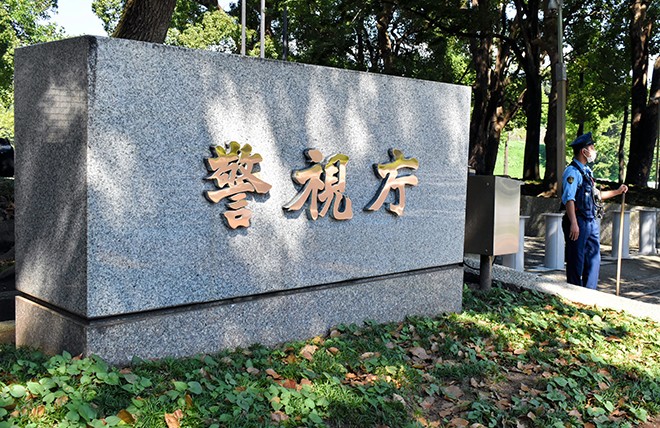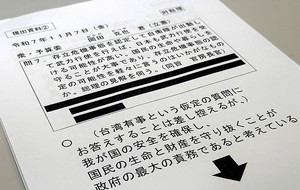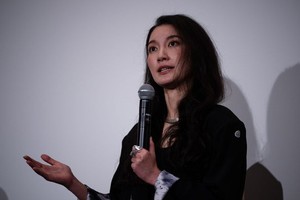THE ASAHI SHIMBUN
January 8, 2025 at 18:41 JST
 The headquarters of Tokyo's Metropolitan Police Department (Asahi Shimbun file photo)
The headquarters of Tokyo's Metropolitan Police Department (Asahi Shimbun file photo)
Seven Chinese nationals were arrested on suspicion of fraudulently purchasing Apple’s MacBook laptops at student discount prices while concealing their intent to resell them overseas.
The Tokyo Metropolitan Police Department said on Jan. 8 that it arrested seven Chinese men and women, including Zhao Li, 51, who resides in Kawaguchi, Saitama Prefecture.
Police did not disclose whether the suspects admitted to or denied the charges.
Zhao has reported ties to the quasi-gang “Chinese Dragon.”
Police suspect that the fraudulently purchased products were resold in China and other countries to fund the gang's activities.
Investigators said that the seven suspects conspired to buy 11 MacBooks worth a total of 3.1 million yen ($19,800) at student discount prices on May 14 last year at an Apple store in Tokyo’s Ginza district, hiding their intent to resell them.
They said Zhao instructed six individuals to make the purchase in-store and later collected the items from them.
Police suspect that the seven used the same method to fraudulently buy around 130 million yen worth of MacBooks and iPads in around 700 transactions across six stores in Tokyo and Kanagawa Prefecture between February and August last year.
The products were believed to have been resold through an import-export company in Tokyo’s Toshima Ward, which police raided on Jan. 7 under the same charges.
Apple’s terms of sale for student discounts, published on its website, include restrictions on the number of purchases allowed per year and a ban on reselling items for profit within one year.
FROM IPHONES TO MACBOOKS?
In September 2023, when the iPhone 15 went on sale, members of the Chinese Dragon were arrested on suspicion of obstructing a business by quarrelling between rival factions in front of an Apple flagship store in Tokyo’s Omotesando district.
One of those arrested received a summary order for paying a fine of 500,000 yen.
The dispute was believed to have stemmed from a rivalry over the right to purchase the new iPhone 15 from the Omotesando store between a faction based in the Oji district of Tokyo’s Kita Ward and a faction based in the Akabane district, also in the ward.
According to investigative sources, Zhao, who is connected to the Chinese Dragon, is the key figure behind the resale scheme.
After the September 2023 incident, the Chinese Dragon divided the stores among its groups for buying iPhones.
Police believe that Zhao and his associates shifted their focus to MacBooks, which could be resold at high prices in China.
The scheme was sophisticated.
Taking advantage of student discounts that offered prices about 10 percent lower than usual, Zhao advertised high-paying part-time jobs on Chinese social media, targeting Chinese university students in Japan to act as buyers.
Some of the students made repeated purchases at the same store by disguising themselves, such as by changing clothes.
The proceeds from the resales were likely a source of income for the Chinese Dragon.
A senior investigator emphasized the significance of the latest arrests, saying, “This is a starting point for dismantling the quasi-gang business model of making money through resales.”
WHY BREAK APPLE’S RULES?
Apple’s terms for student discount purchases include limits on the number of units that can be bought within a year and a ban on reselling items for profit within one year.
However, these terms were ultimately not followed.
Hideaki Yokota, deputy director of MM Research Institute Ltd., who is well-versed in the telecommunications business, speculated, “Apple is likely concerned that tightening the screening process could discourage students from using the discount, so it probably relies on a good faith assumption.”
However, he said, “Apple appears to have prioritized sales over everything else, leading to poor customer management.”
“If the company only enforces superficial terms without proper checks to prevent criminal activity, its brand image will continue to deteriorate,” he added.
(This article was written by Tabito Fukutomi and Arata Mitsui.)




















A peek through the music industry’s curtain at the producers who harnessed social media to help their idols go global.
A series based on diplomatic documents declassified by Japan’s Foreign Ministry
Here is a collection of first-hand accounts by “hibakusha” atomic bomb survivors.
Cooking experts, chefs and others involved in the field of food introduce their special recipes intertwined with their paths in life.
A series about Japanese-Americans and their memories of World War II